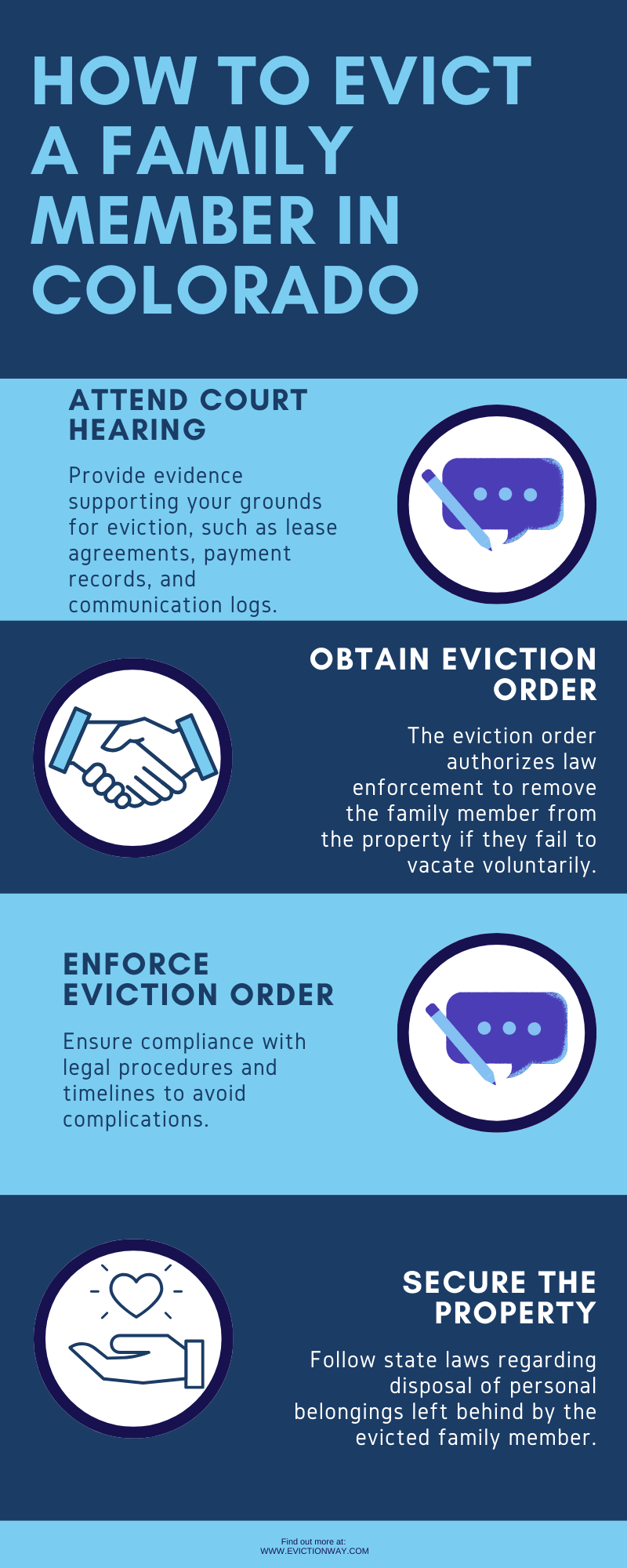Are you facing the difficult situation of needing to evict a family member in Colorado? If so, you’re not alone. Many people find themselves in this situation, and it can be a challenging and emotional process. In this blog article, we’ll provide you with a step-by-step guide on how to evict a family member in Colorado. We’ll cover everything you need to know, from the legal process to practical tips for making the eviction as smooth as possible.
First, it’s important to understand the legal process for evicting a family member in Colorado. The process can vary depending on the specific circumstances, but in general, you’ll need to provide your family member with a written notice to vacate the property. The notice must state the reason for the eviction and the date by which your family member must leave. If your family member does not vacate the property by the deadline, you can file a formal eviction lawsuit with the court.

Once you’ve started the legal process, there are a few things you can do to make the eviction as smooth as possible. First, try to communicate with your family member and explain the situation. Let them know why you’re evicting them and what they need to do to leave the property. If possible, try to reach an agreement with your family member so that they can leave voluntarily. This will save you time and money in the long run.
How To Evict a Family Member In Colorado
Evicting a family member can be a difficult and emotional process. However, it is important to remember that you have the right to protect your property and your rights as a landlord. If you are considering evicting a family member, it is important to follow the proper legal procedures.
1. Give Proper Notice
The first step in evicting a family member is to give them proper notice. In Colorado, you must give the tenant at least 10 days’ written notice to vacate the property. The notice must state the reason for the eviction and the date by which the tenant must vacate.
2. File a Complaint with the Court
If the tenant does not vacate the property after receiving the notice, you will need to file a complaint with the court. The complaint should state the facts of the case and the relief you are seeking.
3. Serve the Tenant with the Complaint
Once you have filed the complaint, you will need to serve the tenant with a copy of the complaint and a summons. The summons will inform the tenant of the date and time of the hearing.
4. Attend the Hearing
At the hearing, you will have the opportunity to present your case to the judge. The tenant will also have the opportunity to present their case. The judge will then make a decision based on the evidence presented.

5. Obtain a Writ of Possession
If the judge rules in your favor, you will be issued a writ of possession. The writ of possession will order the tenant to vacate the property.
6. Enforce the Writ of Possession
If the tenant does not vacate the property after receiving the writ of possession, you will need to contact the sheriff to enforce the writ. The sheriff will remove the tenant from the property and return possession to you.
Additional Resources for Colorado eviction help:
Eviction notice Colorado
In Colorado, a notice to quit for non-payment of rent is a document used by landlords to inform tenants they’ve missed rent. It gives the tenant 10 days from the date they receive the notice to do one of two things:
- Pay the rent in full
- Vacate the property
If the tenant doesn’t comply within the 10 days, the landlord can then proceed with filing an eviction lawsuit in court.
You can download Eviction notice Colorado here.
How Much Does it Cost to Evict a Family Member in Colorado?
Evicting a family member can be a difficult and expensive process. The cost of eviction will vary depending on the specific circumstances of the case, but there are some general costs that you can expect to incur.
| Expense Type | Estimated Cost | Notes |
|---|---|---|
| Filing Fee | $110 – $131 | Varies by county and specifics of the case. |
| Service of Process | $35 – $75 per serve | Depends on the service provider and location. |
| Attorney Fees | Varies | Can be an hourly rate or flat fee, based on the attorney. |
| Default Judgment Fee | $20 – $25 | If the tenant does not respond to the summons. |
| Writ of Restitution | About $30 | To command the sheriff to remove the tenant. |
| Sheriff or Moving Company | $100+ (Sheriff) | Fees for moving companies will vary widely. |
| Locksmith | $75 – $150 | If changing the locks is necessary. |
| Additional Court Costs | Varies | Costs can accumulate for additional filings or legal actions. |
- Filing fees: The first step in the eviction process is to file a complaint with the court. The filing fee for an eviction case in Colorado is $110.
- Service of process: Once the complaint has been filed, it must be served on the tenant. The cost of service of process will vary depending on the method of service.
- Attorney fees: If you hire an attorney to represent you in the eviction process, you will be responsible for their fees. Attorney fees can vary widely, so it is important to get a quote from an attorney before hiring them.
- Court costs: In addition to the filing fee, you may also be responsible for other court costs, such as the cost of a hearing or a trial.

FAQs: Evicting a Family Member in Colorado
Here are some of the most frequently asked questions about evicting a family member in the Colorado:
What are the grounds for evicting a family member in Colorado?
In Colorado, you can evict a family member for the same reasons you would evict any other tenant, such as nonpayment of rent, violating the lease agreement, or causing damage to the property.
What is the process for evicting a family member in Colorado?
The process for evicting a family member in Colorado is similar to the process for evicting any other tenant. You must first give the family member a written notice to vacate the property. If the family member does not vacate the property within the time specified in the notice, you can file an eviction lawsuit with the court.
Can I evict a family member who is not on the lease?
Yes, you can evict a family member who is not on the lease. However, you must first prove that the family member is a tenant. You can do this by showing that the family member has been living in the property for a period of time, has been paying rent, or has otherwise acted like a tenant.
What are some of the challenges of evicting a family member?
Evicting a family member can be challenging, both emotionally and legally. It is important to be prepared for the challenges that you may face, such as resistance from the family member, emotional distress, and legal complications.

What are some tips for evicting a family member?
Here are some tips for evicting a family member:
- Be clear and direct about your expectations.
- Give the family member plenty of time to vacate the property.
- Be prepared to negotiate with the family member.
- Seek legal help if necessary.
Can you physically remove someone from your property in Colorado?
No, it is illegal to physically remove someone from your property in Colorado, even if they are trespassing. You must follow the legal eviction process.
What is an illegal eviction in Colorado?
An illegal eviction occurs when a landlord attempts to remove a tenant without following the proper legal procedures, such as changing locks or shutting off utilities.
What is the legal age to move out in Colorado?
The legal age to move out in Colorado is 18.
Can you evict a spouse in Colorado?
No, In Colorado, during a divorce, neither spouse can simply force the other out of their shared home.
Related:
